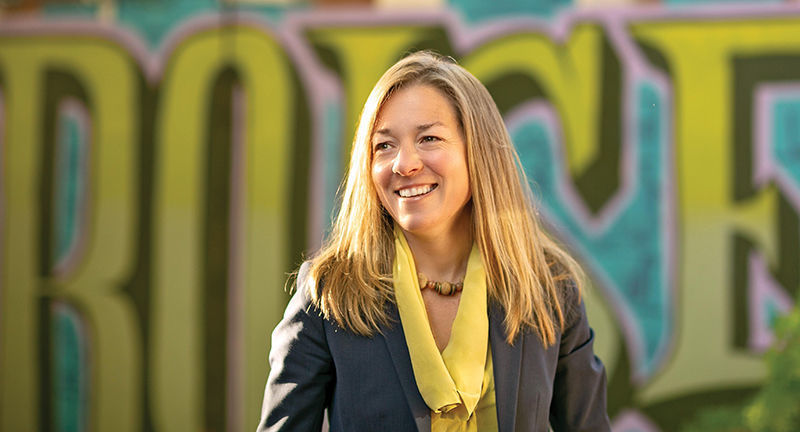Lauren McLean is known to her constituents as a bike commuter. She can also be found most days running the “hills” — as residents call what most people would consider mountains — around the city. An eventful first year as mayor since her election in a December 2019 runoff limited the miles she logged as she addressed the immediate concerns of COVID-19 and racial justice protests while mapping the future of one of the nation’s fastest growing cities.
Boise has had Black Lives Matter demonstrations. Counterprotesters came to defend the police, and that group was armed. Your response is one reason you have been subject to petition for a recall. What happened?
The first vigil that we had shortly after George Floyd’s killing was truly beautiful — 5,000 to 7,000 people by various counts showed up wearing masks, as we requested, and sat quietly for eight minutes, and then listened to speakers and dispersed. In the evening, that changed a bit. And then, at the end of June, we did have that protest here that was met by counterprotesters. . . .
I truly believe in the right that we have to protest, to say whatever we want to say, even when it might be disagreeable to what I believe. But it is never OK to be violent. And I did call it out the next morning because of . . . the [white nationalist] language that was being yelled at the same time that people were being hit. It was something that I wanted to make clear was not OK in our community. It did not reflect the values of the people who live here. And I knew that we could do better.
And so, we had another protest [in July], on the night that we passed our budget, and we prepared with our new police chief to make sure that violence was not possible. We did everything we could to prevent it. That second time around, we saw the same counterprotesters. We saw the same level of ammunition and arms, but had a different plan to make sure that everybody was separated to prevent the violence we’d seen from the last time around.

Boise is growing faster than anybody expected. People are moving here from California in large numbers. Home prices are rising way out of expectations. How do you anticipate growth, and what can you do as a mayor?
What we saw in the [2019 mayoral] election was that many of our residents were feeling the impact of growth. That came down to the traffic and congestion that was increasing, the inability to find a home at their budgets within our city limits — frustration around that. COVID, and the economic crisis related to it, has really exposed more publicly those very weaknesses that we had here in our community, those pressure points that people were feeling. While addressing public health, we’ve been moving forward on affordable housing policy. We’ve been moving forward on climate innovation and climate policy, because I believe that getting ahead of that is actually going to give us a leg up economically.
I expect that in this, Boise — and we’ve seen in the market already — will continue to grow because now that people can take their jobs anywhere, why not live in an amazing place like this? It seems affordable if you’re coming from a coast, and that makes it much more difficult for our residents to find a place of their own and to build a life. . . .
I’ve launched a land trust, a housing land bank here so that we can use land and leverage it for housing developments that are [mixed income]. We are looking at changing some policies that would provide incentives like more density or higher buildings along transit corridors if you included houses at 80 percent [of median household income in the area].
Boise is a unique place: the end of the desert, the beginning of the mountains. Lots of decisions to be made — environmentally, housing, so on. Can you imagine the community 10 years from now?
It’s hard to know the long-term impacts of the economic crisis right now because I believe that the impacts of this will last quite a while. However, as I said earlier, it’s very likely that we will be one of those places where “COVID refugees” — people that can transport their jobs — choose to come because we’re so special. And we will continue to focus on preserving our open spaces and keeping our river and water clean and protected. We will become more dense in neighborhoods throughout this community because we need housing for our residents. And that, I really believe, will demonstrate that a city of our size can lead on climate. And with that comes tighter relationships with [Boise State University] and more opportunities economically that people can take advantage of.
Ten years from now, we’ve protected all that we can in the foothills. We’ve extended pathways along canals that connect our farmlands to our foothills. We’ve restored river banks where we can with levy funds. And then, we’ve made good on the belief that I have that we can do more to ensure that housing’s affordable, and we have more homes while protecting our environment and the health and, really, personality of our neighborhoods. And we’ve demonstrated that climate adaptation and innovation is key to the economy of the future.
Interview by Jerry Brady ’58, a former Democratic candidate for Idaho governor and publisher of the Idaho Falls Post Register. Read more, including how Father Ted Hesburgh, CSC, inspired McLean’s career in public service, at magazine.nd.edu/her-time-to-run. The entire discussion can be heard on our podcast, The Endless Conversation, at magazine.nd.edu/podcast.